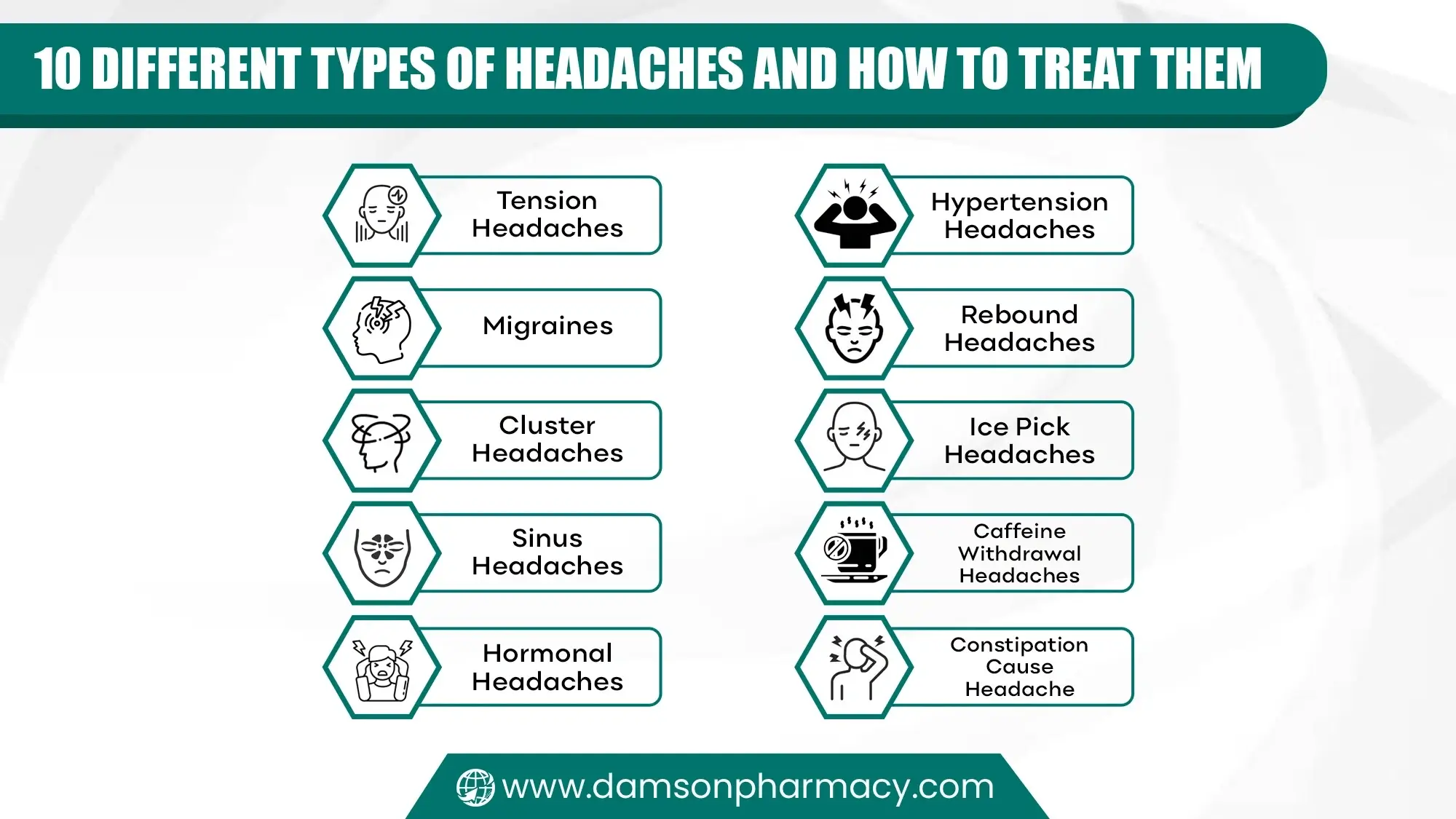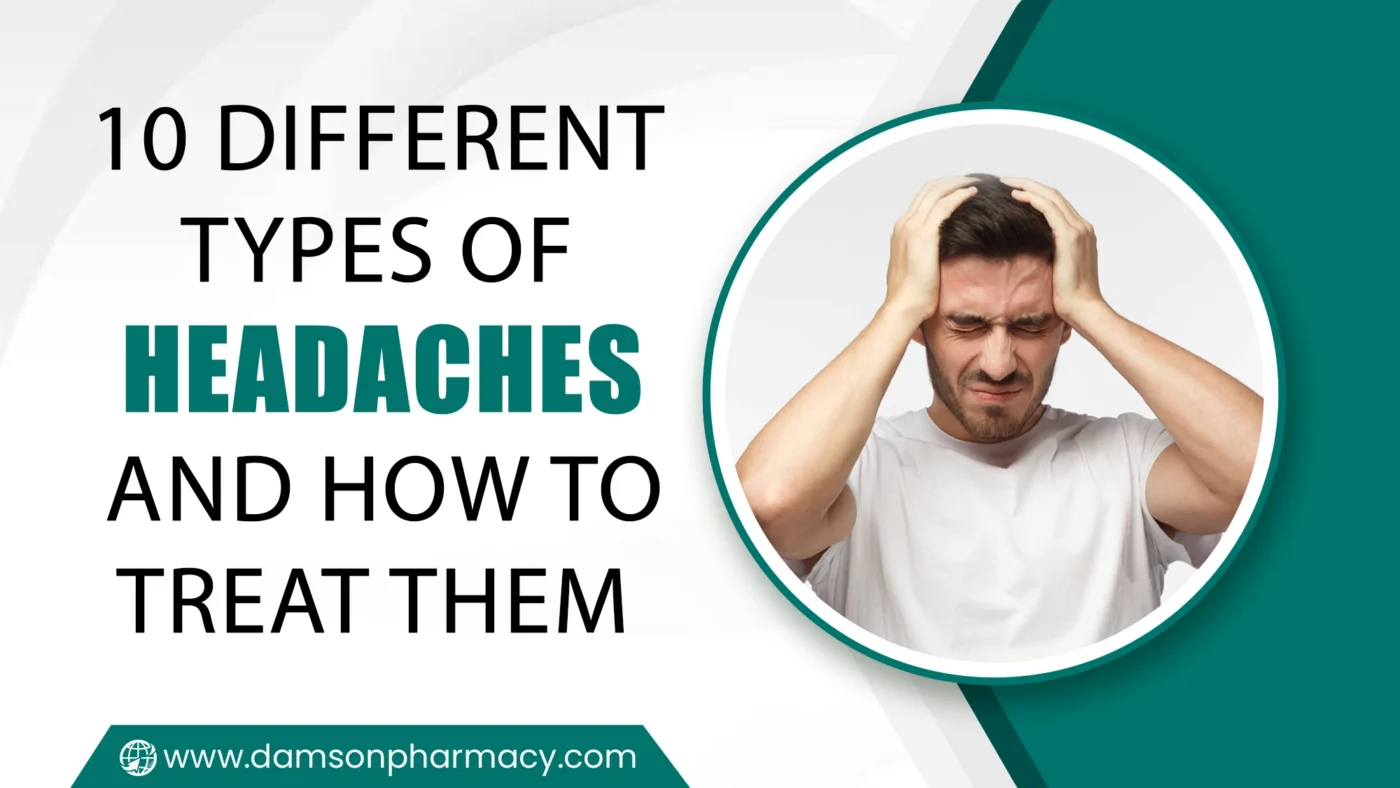10 Different Types of Headaches and How to Treat Them
There are many different kinds of headaches, and knowing the different types of headaches will help you prevent and cure them effectively. Headaches result from a thousand things, such as stress, dehydration, and other illnesses like hypertension or gastrointestinal diseases like constipation and headaches.
Knowing what type of headache you have is the secret to curing and managing the headache. In this article, we are going to explain 10 various headache types, the reason behind them, and the most effective way of treating them so that you can tackle the pain efficiently.

1. Tension Headaches
The most prevalent types of headaches is a tension headache. It is caused by stress, anxiety, or muscle strain in the neck and shoulders. The pain usually will be a mild, aching feeling across the head, often described as a “Tight Band.”
They range from mild to severe and are not usually bye with other symptoms such as nausea or sensitivity to light. Non-prescription pain medications and stress-reduction techniques usually control them to minimize tension and relieve muscular tension.
The Treatment for Tension Headaches
- Over-the-counter pills such as aspirin or ibuprofen can be beneficial for mild to moderate Tension Headaches.
- Relaxation methods like deep breathing exercises will reduce stress.
- Mindfulness meditation is helpful in relaxing muscles and causing relaxation.
- Both techniques can successfully cure tension headaches.
2. Migraines
Migraines are a disabling headache disorder, characterized by intense throbbing headache, nausea, and increased sensitivity to light or sound. Although migraines have no known aetiology, they can be triggered by a wide range of dissimilar precipitants, such as hormonal imbalance, food, stress, or environmental factors.
The migraines mostly last for an hour to a full day and can substantially interfere with daily activity. Recognizing and eradicating the symptoms with combined appropriate medicines is important to cure severe migraines and their frequency effectively.
The Treatment for Migraines
- Prescription medications such as Triptans are also employed to treat migraines.
- Triptans work by narrowing blood vessels in the brain, which eases migraine pain.
- Preventive drugs can be employed to reduce the number and severity of migraines.
- Preventive drugs consist of medications such as beta-blockers, antidepressants, and anti-seizure medications.
- Preventive strategies are aimed at lowering migraine attacks and improving quality of life.
- Over-the-counter analgesics may be combined with prescription medication for immediate relief.
- Migraines can be controlled well with suitable combinations of drugs based on individual needs.
3. Cluster Headaches
Cluster headaches are very painful and typically appear in clusters, often at the same time of the year. It typically occurs on one side of the head and is an intense, stabbing pain, often in the area of the eyes. They are short-lived but very disabling. Cluster headaches have a very abrupt onset and often occur several times a day when a cluster occurs.
The Treatment for Cluster Headaches
- Oxygen therapy may provide relief immediately for cluster headaches.
- Injectable medications, such as local anesthetic (lidocaine), are effective for rapid pain relief.
- Oral medications like Triptans help treat cluster headaches during attacks.
- Corticosteroids are also used for long-term management of cluster headaches.
- These therapies have a number of alternatives in the treatment of severe pain.
4. Sinus Headaches
Sinus headaches are caused by infection or inflammation of the sinuses, caused most frequently by conditions such as a cold, allergies, or sinusitis. The headache usually appears on the forehead, cheeks, and eyes, which is quite similar to the development of a sinus infection.
The headache itself is usually preceded by pressure, congestion, and facial pain. Treatment is usually successful with decongestants, antihistamines, or, if bacteria infect it, antibiotics, and typically ease the headache and sinus problem.
The Treatment for Sinus Headaches
- Over-the-counter decongestants can alleviate sinus pressure and headaches.
- Antihistamines will ease sinus congestion and reduce headache symptoms.
- If a bacterial infection occurs then antibiotics are administered to cure the infection.
- These therapies are effective in managing both sinus pressure and headache pain.
5. Hormonal Headaches
Hormonal Headaches are typically associated with hormonal fluctuations, particularly in women. They occur during menstruation, pregnancy, or menopause. These are migraines or tension headache-like headaches and are influenced by hormone fluctuation, more particularly estrogen.
Hormonal headaches are variable in frequency and severity but get better as hormone levels stabilize in different phases of life. It is also a part of types of headaches because of its impact and hormonal fluctuations.
The Treatment for Hormonal Headaches
- Hormonal therapy, such as birth control tablets, can control hormone levels and avoid hormonal headaches.
- Over-the-counter painkillers relieve the pain of hormonal headaches for a short term.
- Birth control pills may stabilize hormone swings, decreasing the severity and frequency of these headaches.
- Painkillers control pain until long-term solutions start yielding results.
6. Hypertension Headaches
High blood pressure, or hypertension, may cause headaches if the blood pressure is very high. The headache is often dull and persistent and sometimes is localized at the back of the head. Headache becomes worse with activity, tension, or emotional stress.
It is important to manage hypertension through medication and lifestyle modifications to avoid such headaches and the risk of developing other more complicated health issues.
The Treatment for Hypertension Headaches
- Dietary control of hypertension by modification, including a low-sodium diet and physical exercise, prevents headaches.
- Antihypertensive medications, such as beta-blockers, may reduce the frequency of hypertension headaches.
- Medications also control high blood pressure, decreasing the frequency and severity of these headaches.
- Lifestyle alterations are associated with medications for better prevention of chronic headaches.
7. Rebound Headaches
Rebound Headaches, commonly known as medication-overuse headaches, are those that result when painkiller medicines are taken excessively. Such headaches are typically associated with individuals who frequently take over-the-counter drugs to relieve constant headaches.
With time, the body becomes dependent on the medicine, and it becomes less effective, leading to rebound headaches. It creates a vicious cycle in which the higher the utilization of drugs, the higher the incidence of headaches so it becomes more challenging to mitigate the underlying illness without altering the consumption of drugs.
The Treatment for Rebound Headaches
- The most important thing about controlling rebound headaches is not to take too many painkillers.
- Weaning off the drug slowly with the assistance of a physician is essential.
- Lifestyle improvements such as stress management and proper fluid consumption may prevent rebound headaches.
- Shifting medication use and adding in healthy habits are the bridges to long-term relief.
8. Ice Pick Headaches
Ice pick headaches are characterized as a brief, sharp, stabbing pain that is normally only a matter of seconds. The severe pain is normally likened to an ice pick being thrust into the head. It is a one of serious types of headaches among patients.
The headaches usually attack abruptly, usually on one side of the head, and though brief, they are very painful. Though they are not persistent, they are debilitating for people who have them on a recurring basis.
The Treatment for Ice Pick Headaches
- Painkillers can be taken to relieve short-term ice pick headaches.
- For recurrent cases, prescription medications like anticonvulsants or tricyclic antidepressants may be needed.
- Stress reduction and avoidance of the recognized precipitating factors might decrease the frequency of these headaches.
- A combination of therapies is effective in controlling ice pick headaches.
9. Caffeine Withdrawal Headaches
Caffeine withdrawal headaches arise when individuals who consume large amounts of caffeine regularly reduce or stop consumption substantially. They are often intense and accompanied by other signs such as fatigue, mood swings, and lack of concentration.
The intensity of the headache may vary from one to another but typically subsides after a few days as the body adjusts to a lack of caffeine. Gradually reducing the use of caffeine prevents withdrawal headaches.
The Treatment for Caffeine Withdrawal Headaches
- Reducing caffeine intake Gradually is beneficial in reducing withdrawal symptoms.
- Over-the-counter drugs may help relieve pain that occurs during withdrawal.
- Wean off caffeine gradually to prevent terrible headaches and other symptoms.
- Painkillers provide relief for a short while as the body unwinds from lowered caffeine levels.
10. Constipation Cause Headache
The buildup of waste in the digestive system causes constipation and headaches. Constipation, if left unattended, causes the buildup of toxins in the blood, and this can be a contributing factor to headaches.
The body not being able to flush out the waste effectively is sure to be uncomfortable and creates chances for headaches through pressure and toxin accumulation.
The Treatment for Constipation-Related Headaches
- The primary management of constipation is to increase the intake of fibre and drink a lot of water.
- Laxatives or stool softeners can be given as needed.
- Proper management of constipation can also reduce the frequency of related headaches.
- Healthy digestion reduces toxin buildup, decreasing headache occurrence.
Conclusion
It is critical to know why and what types of headaches they are so they can be addressed appropriately. No matter if it is tension headaches, migraines, or constipation headaches that are the issue, addressing the cause is a must for ultimate relief.
Quick relief can come in the form of over-the-counter pain pills, but if it is ongoing or severe, then medical attention must be taken from a specialist. Medications, lifestyle improvements, and reducing stress will cure the symptoms and prevent frequent headaches.
If you are not sure of the cause of the headache, then consult a doctor for proper treatment and diagnosis.
Reference
Acknowledgment:
Damson Pharmacy only refers to credible, authoritative sources for our content. If you’re curious about how we ensure the integrity of our content, we encourage you to read our Content Information Policy.

